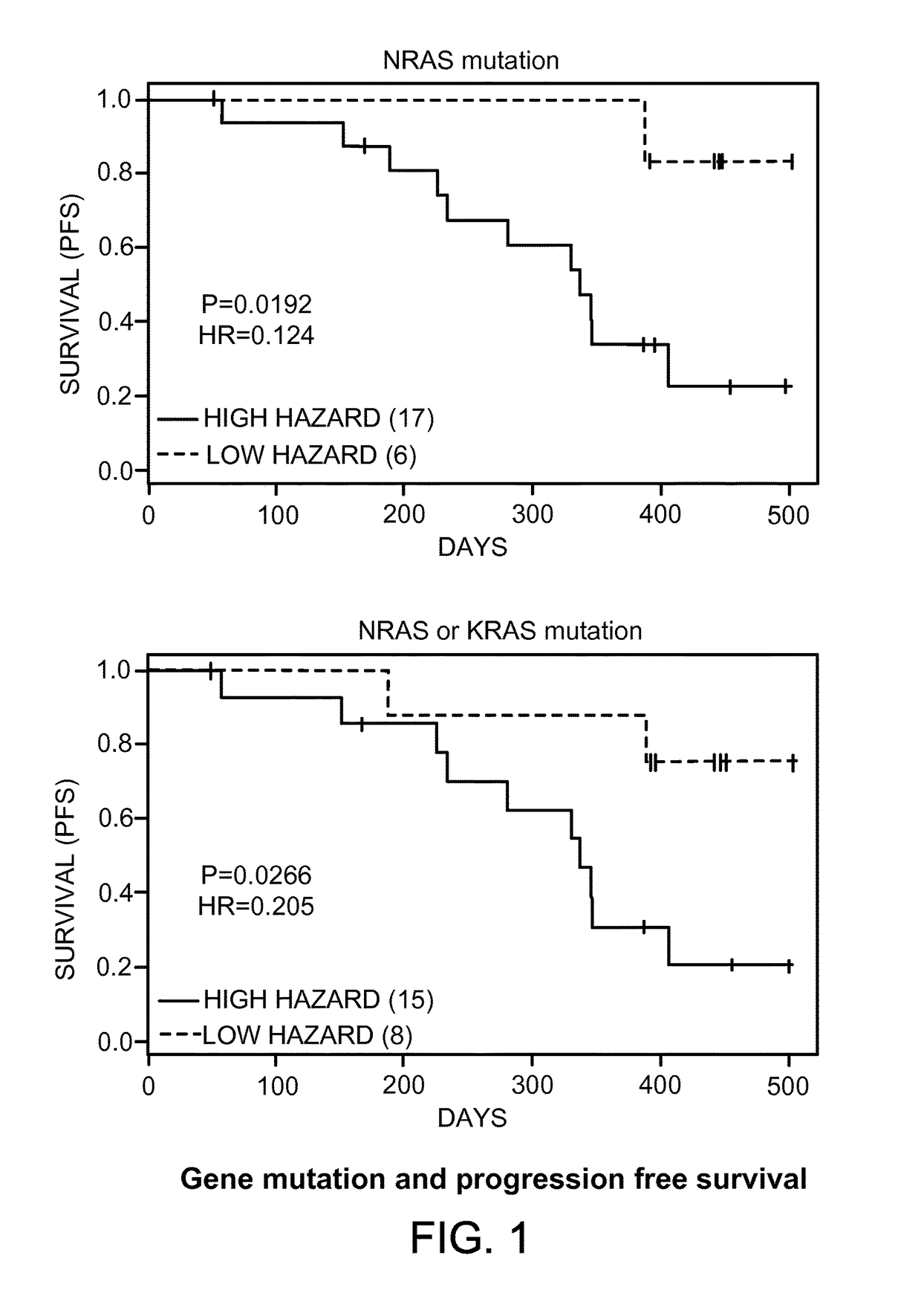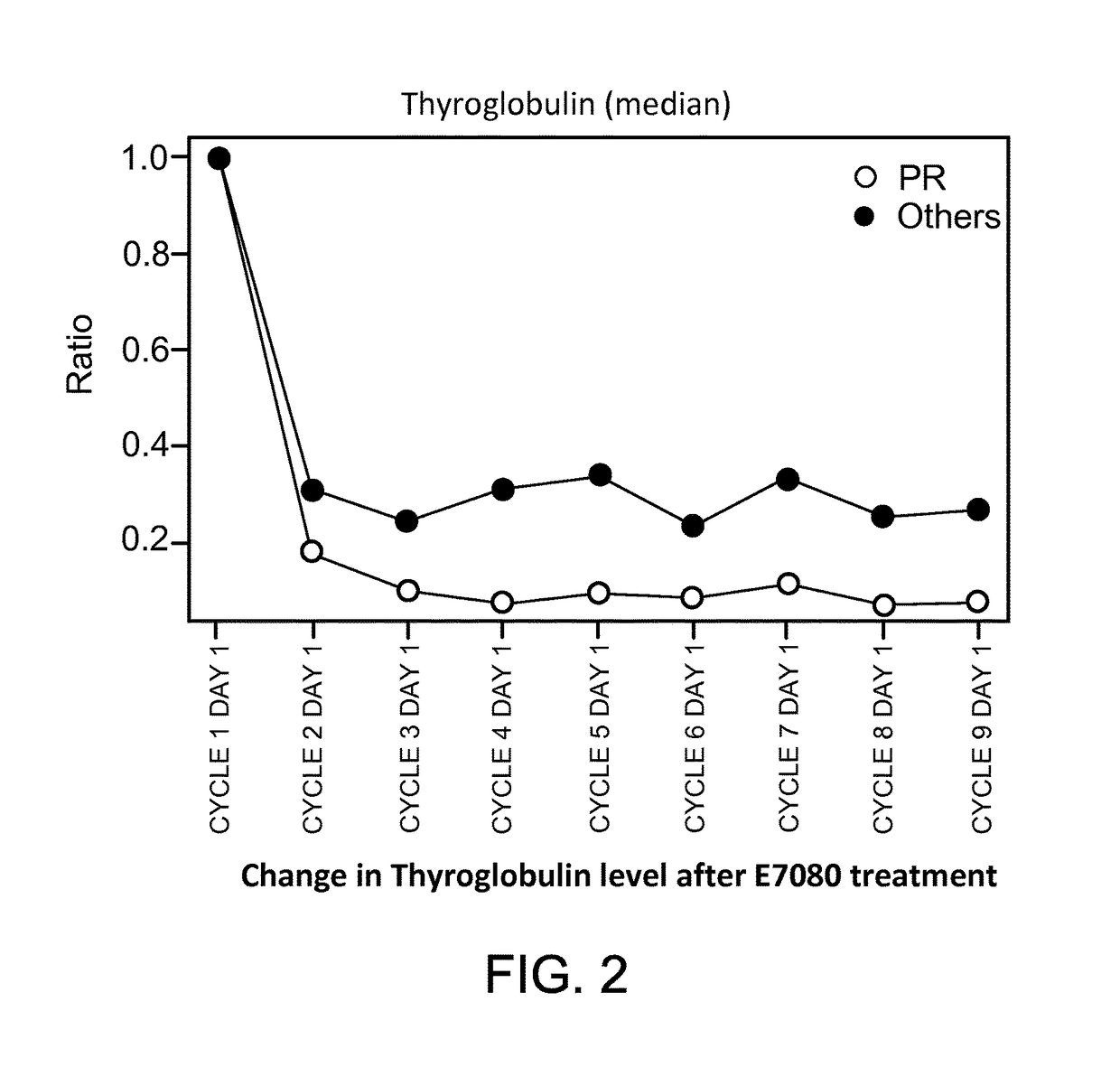Biomarkers for predicting and assessing responsiveness of thyroid and kidney cancer subjects to lenvatinib compounds
a biomarker and kidney cancer technology, applied in the field of biomarkers and thyroid and kidney cancer, can solve the problems of delayed treatment, ineffective treatment, and undesirable side effects of most anti-tumor treatments, and achieve the effect of strong prediction of the likelihood of a subject's treatment
- Summary
- Abstract
- Description
- Claims
- Application Information
AI Technical Summary
Benefits of technology
Problems solved by technology
Method used
Image
Examples
example 1
Status as Predictive Biomarkers for Responsiveness to Therapy Comprising E7080
[0154]Purpose:
[0155]Tumor response and prolonged disease stabilization were observed in differentiated thyroid cancer patients treated in phase II with E7080 (lenvatinib). This experiment was directed at identifying amino acid mutations that are useful in predicting whether subjects respond to treatment with E7080 using three criteria of response: best overall response, tumor shrinkage, and progression free survival.
[0156]Materials and Methods:
[0157]Tissue samples were obtained at surgery before the patients had received any therapy comprising E7080 and were routinely processed with formalin fixed, paraffin embedded tissues (FFPE). The protocol that was used was approved by the institutional review board, and informed consent was obtained from each subject. Tumor tissue samples from 27 patients, for which tissues were available, were used for mutation analysis. DNA was isolated from FFPE tumor blocks colle...
example 2
ulin as a Biomarker for Therapy Comprising E7080 in Thyroid Tumors
[0181]Purpose:
[0182]This experiment was directed at determining whether changes in thyroglobulin levels are predictive of whether patients respond to treatment with E7080 using three criteria of clinical response: tumor response, tumor shrinkage, and progression free survival.
[0183]Material and Methods:
[0184]The serum for the thyroglobulin assays was collected within 72 hours prior to Day 1 of all cycles. 24 mg of E7080 was administered orally, daily continuously in 28-day cycles. Serum samples from 58 patients were used for thyroglobulin measurements. 6 mL of blood was drawn into red top tubes and let to clot at room temperature for at least 30 min. Within 60 minutes of sample collection, the tubes were centrifuged for 15 minutes at 20-25° C. at 1000×g. The supernatant was drawn without disturbing the pellet, put into sample tubes with serum filter and shipped frozen to the central lab for testing on the day of colle...
example 3
Chemokine, and Angiogenic Factors (Blood Biomarkers) as Predictive and Response Biomarkers of E7080
[0191]Purpose:
[0192]Angiogenesis is regulated by signaling through multiple growth factor receptors, such as VEGF and FGF receptor. VEGF receptor signaling is also associated with immune cell function. The purpose of this analysis was to measure cytokine, chemokine and angiogenic factors (collectively referred to herein as “blood biomarkers”) in serum samples obtained from patients in clinical trials at both pre- and post-treatment with E7080 and to identify blood biomarkers which can be used to predict whether patients will respond to treatment with E7080. For these analyses, three criteria of response were employed, namely: tumor response, % of tumor shrinkage and progression free survival.
[0193]“Tumor response” (TR) compares subjects with “Partial Response” (PR) with subjects with either Stable Disease (SD) or Progressive Disease (PD).
[0194]Materials and Methods:
[0195]Patients recei...
PUM
| Property | Measurement | Unit |
|---|---|---|
| time | aaaaa | aaaaa |
| time | aaaaa | aaaaa |
| time | aaaaa | aaaaa |
Abstract
Description
Claims
Application Information
 Login to View More
Login to View More - R&D
- Intellectual Property
- Life Sciences
- Materials
- Tech Scout
- Unparalleled Data Quality
- Higher Quality Content
- 60% Fewer Hallucinations
Browse by: Latest US Patents, China's latest patents, Technical Efficacy Thesaurus, Application Domain, Technology Topic, Popular Technical Reports.
© 2025 PatSnap. All rights reserved.Legal|Privacy policy|Modern Slavery Act Transparency Statement|Sitemap|About US| Contact US: help@patsnap.com


